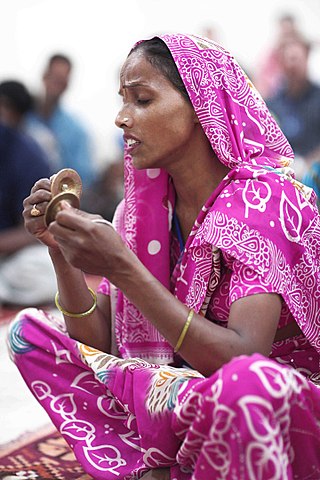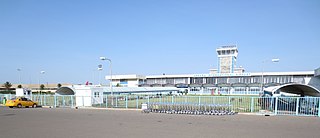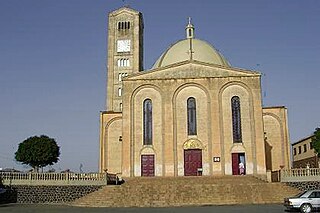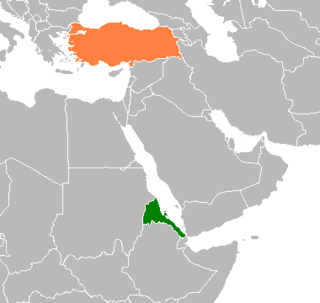
Asmara, or Asmera, is the capital and most populous city of Eritrea, in the country's Central Region. It sits at an elevation of 2,325 metres (7,628 ft), making it the sixth highest capital in the world by altitude and the second highest capital in Africa. The city is located at the tip of an escarpment that is both the northwestern edge of the Eritrean Highlands and the Great Rift Valley in neighbouring Ethiopia. In 2017, the city was declared as a UNESCO World Heritage Site for its well-preserved modernist architecture. According to local traditions, the city was founded after four separate villages unified to live together peacefully after long periods of conflict. Asmara had long been overshadowed by nearby Debarwa, the residence of the Bahr Negash or the governor of the coastal province, however it still existed as a major settlement for over half a millennium and enjoyed some importance as it stood on the trade route to Massawa. Asmara first rose to prominence during the 20th century, when it became capital of Italian Eritrea. Under Italian rule the city of Asmara experienced rapid urbanization and modernization.
Jāti is the term traditionally used to describe a cohesive group of people in the Indian subcontinent, like a tribe, community, clan, sub-clan, or a religious sect. Each Jāti typically has an association with an occupation, geography or tribe. Different intrareligious beliefs or linguistic groupings may also define some Jātis. The term is often translated approximately in English as caste.

A tala literally means a 'clap, tapping one's hand on one's arm, a musical measure'. It is the term used in Indian classical music similar to musical meter, that is any rhythmic beat or strike that measures musical time. The measure is typically established by hand clapping, waving, touching fingers on thigh or the other hand, verbally, striking of small cymbals, or a percussion instrument in the Indian subcontinental traditions. Along with raga which forms the fabric of a melodic structure, the tala forms the life cycle and thereby constitutes one of the two foundational elements of Indian music.
The 1968 African Cup of Nations was the sixth edition of the Africa Cup of Nations, the association football championship of Africa (CAF). It was hosted by Ethiopia. The field expanded to eight teams, split into two groups of four; the top two teams in each group advanced to the semifinals. Congo-Kinshasa won its first championship, beating Ghana in the final 1−0.
Jati or JATI may refer to:

Asmara International Airport is the international airport of Asmara, the capital of Eritrea. It is the country's largest airport and the only one receiving regularly scheduled services as of 2017.

The Eritrean Catholic Church or Eritrean Eastern Catholic Church is a sui iuris (autonomous) Eastern Catholic church based in Eritrea. As a particular church of the Catholic Church, it is in full communion with the Holy See. It was established in 2015 when its territory was separated from the Ethiopian Catholic Church. The church is organized under a metropolitan bishop who exercises oversight of a number of suffragan dioceses. In its liturgical services, it uses the Alexandrian Rite in the Ge'ez language.

The Church of Our Lady of the Rosary, Asmara is a Catholic church built in the early 1920s in Asmara, when the city was the capital of Italian Eritrea. Often called "The Cathedral", it is a large Lombard Romanesque style church in the centre of the city, built in 1923 to serve as the principal church of the Apostolic Vicariate of Eritrea.

The caste system in India is the paradigmatic ethnographic instance of social classification based on castes. It has its origins in ancient India, and was transformed by various ruling elites in medieval, early-modern, and modern India, especially in the aftermath of the collapse of the Mughal Empire and the establishment of the British Raj. It is today the basis of affirmative action programmes in India as enforced through its constitution. The caste system consists of two different concepts, varna and jati, which may be regarded as different levels of analysis of this system.
The Eritrean Premier League is the highest division in football in Eritrea. The league's first season ended in 1994.

Eritrea–United States relations are bilateral relations between Eritrea and the United States.

Biola Tak Berdawai is an Indonesian film directed by Sekar Ayu Asmara. It was released by Kalyana Shira Film on 22 March 2003, with wider release on 4 April. Telling the story of a rape victim who attempts to use music to heal an autistic boy, it was shown at the Cairo International Film Festival, where it secured a Best New Director award for Asmara. It was also Indonesia's submission to 76th Academy Awards for Best Foreign Language Film.
Football is the most popular sport in Eritrea. After being under Ethiopian control, Eritrea gained its independence in 1991 and in 1998 the country became a member of FIFA.
The 2008–09 Indonesia Super League was the first edition of the Indonesia Super League, which replaced the Premier Division as the top-tier football competition in the country. The league was sponsored by Djarum and was officially called Djarum Super Liga Indonesia (SLI) or Djarum Indonesia Super League (ISL).

Italian Eritreans are Eritrean-born citizens who are fully or partially of Italian descent, whose ancestors were Italians who emigrated to Eritrea during the Italian diaspora, or Italian-born people in Eritrea.

Serafino is a 1968 Italian film directed by Pietro Germi.

Italian Eritrea was a colony of the Kingdom of Italy in the territory of present-day Eritrea. The first Italian establishment in the area was the purchase of Assab by the Rubattino Shipping Company in 1869, which came under government control in 1882. Occupation of Massawa in 1885 and the subsequent expansion of territory would gradually engulf the region and in 1889 the Ethiopian Empire recognized the Italian possession in the Treaty of Wuchale. In 1890 the Colony of Eritrea was officially founded.

Asmara Theatre, also known as Asmara Opera, is a theatre in Asmara, Eritrea. It was constructed in 1918 following a design by the Italian engineer Odoardo Cavagnari, with later renovations in 1936.
Boy is a masculine given name, nickname, and surname. It may refer to:

Eritrea–Turkey relations are the foreign relations between Eritrea and Turkey. Turkey has an embassy in Asmara since 2013, while Eritrea does not have an embassy in Turkey but the Turkish embassy in Doha, Qatar, is accredited to Eritrea. Turkey was one of the first countries to recognize Eritrea in 1993 and both countries established diplomatic relations in the same year.













